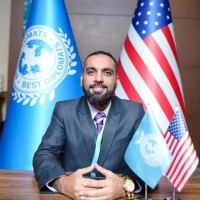What Are Examples of Successful Risks Taken by Executives?
Taking risks is an integral part of achieving success in the business world. In this article, insights from a Founder and a CEO provide valuable lessons in risk management. The first insight explores how embracing innovation can transform a business, while the final piece of advice discusses the benefits of expanding into full-service landscaping. Discover a total of nine expert insights that illuminate the path to effective risk-taking.
- Embrace Innovation to Transform Business
- Transition to Agile Methodologies
- Expand Beyond Residential Jobs
- Invest in Network Infrastructure Early
- Pivot to Address Gig Economy Issues
- Leverage Blockchain for Digital Ownership
- Expand Programs Internationally
- Pivot Online During COVID
- Expand to Full-Service Landscaping
Embrace Innovation to Transform Business
How Embracing Innovation Transformed My Business
As the founder of a legal process outsourcing company, one significant risk I took was deciding to invest in a new technology platform to enhance our service offerings.
At the time, the idea of integrating smart contracts and AI tools seemed daunting, especially with limited initial capital. I vividly remember sitting down with my team, weighing the potential benefits against the financial strain it could impose.
Ultimately, we took the plunge, and the investment paid off. Not only did it streamline our processes and improve client satisfaction, but it also positioned us as a leader in the industry.
This experience taught me the importance of conducting thorough research and creating a clear strategy before taking risks. It reinforced that while risks can be intimidating, they can lead to substantial rewards when approached with careful planning and a willingness to adapt.

Transition to Agile Methodologies
One notable risk I took as the leader of Software House was the decision to transition our entire development process to agile methodologies. At the time, we were primarily using traditional project management approaches, which had served us well. However, I recognized the growing need for flexibility and faster delivery times in our industry. This pivot required an upfront investment in training our staff and restructuring our workflows, which initially felt daunting. There was considerable uncertainty about whether this change would disrupt our existing projects and client relationships.
The gamble paid off remarkably. Not only did we improve our project turnaround time by 30%, but we also saw a significant increase in client satisfaction as we were able to adapt quickly to their feedback and changing needs. This experience taught me invaluable lessons about risk management: primarily, that informed decision-making grounded in data is essential. Conducting thorough research and involving the team in the transition process fostered buy-in and reduced resistance to change. It also highlighted the importance of embracing a culture of adaptability-a key element in today's fast-paced business environment. By creating an agile framework, we equipped ourselves to respond to market changes swiftly, proving that well-calculated risks can lead to substantial rewards.
Expand Beyond Residential Jobs
One of the biggest risks I took with Ponce Tree Services was expanding the business beyond simple residential jobs to larger commercial contracts. We had been doing well serving homeowners in the DFW area, but commercial work was a completely different scale. It required us to invest in new equipment, hire more-specialized staff, and ensure we could manage larger projects with more complex timelines and safety regulations. I weighed the potential growth against the possibility of overextending our resources, but my years of experience in the industry and my certification as an arborist gave me confidence that we could handle it. After landing our first big commercial contract, not only did we successfully deliver, but it opened doors for more opportunities in this market. This expansion doubled our revenue in the following year.
What this taught me about risk management is that you need a strong foundation before you take a big leap. My background, starting in the tree industry at 10 years old and learning the ropes from my father, gave me a deep understanding of both the technical and business sides. I made sure we had the right team, the right equipment, and strong customer relationships before expanding. In the end, taking a calculated risk with the right preparation can pay off tremendously.

Invest in Network Infrastructure Early
One of the biggest risks I took as an executive was during the early-years of my telecommunications business when I decided to invest heavily in advanced network infrastructure before the demand was fully established. At that time, I anticipated that businesses would need faster and more reliable internet connections, but the market hadn't quite caught up. It was a significant financial commitment, and if the market hadn't responded as I predicted, the investment could have set us back for years. However, my military background in telecommunications and my MBA in finance gave me the tools to carefully evaluate this risk from multiple perspectives. I reviewed everything from forecasted demand trends to cash-flow stress tests. When the demand did pick up, we were already positioned as leaders with unmatched speed and reliability, which allowed us to attract several major clients and scale the business rapidly. This experience underscored the importance of balancing calculated risk with strategic vision and the value of being prepared for market shifts before they happen. It taught me that a well-calculated risk, backed by industry insight and rigorous financial planning, can pay off far beyond the initial risk, strengthening both market position and competitive advantage.
Pivot to Address Gig Economy Issues
Taking risks is an inherent part of being an entrepreneur, and one notable risk I took was pivoting from a traditional software-sales role to founding Gig Wage. At that time, the gig economy was gaining traction, but the systemic issues with payments and contractor management weren't fully addressed. Investing time and resources into an unestablished niche was daunting but crucial.
We built an innovative platform that focused on enhancing payment flexibility for contractors. This was a gamble because it required businesses to alter established payroll processes. However, it paid off by significantly cutting down payment-processing times and enabling companies to optimize their operations, as seen with clients like the CFO of a Hospitality Staffing company who now focuses on broader business strategies due to efficiencies gained.
The experience taught me the importance of listening to market needs and being willing to challenge conventional solutions. By focusing on what truly benefits both businesses and contractors, we carved out a space in the industry that sustains and amplifies the gig economy ecosystem. Embracing these calculated risks has been key to our success in creating lasting partnerships with clients who value our custom solutions.

Leverage Blockchain for Digital Ownership
One of the most significant risks I took was transitioning from a lucrative career as a top web engineer to building a start-up that leverages blockchain technology to prove ownership of digital files and text. This risk paid off in multiple ways, as it allowed me to combine my passion for technology, blockchain, and artificial intelligence to create a solution that addresses a critical need in the market.
This experience taught me the importance of embracing uncertainty and trusting my instincts as a leader. It also highlighted the need to foster open communication and transparency within the organization, as it enables teams to adapt quickly to changing circumstances. I learned that risk management is not about avoiding risks altogether but about taking calculated risks that align with the company's vision and values. By doing so, leaders can create an environment that encourages innovation, creativity, and growth.

Expand Programs Internationally
Hi,
I'm Fawad Langah, Director General at Best Diplomats organization, specializing in leadership, business, global affairs, and international relations. With years of experience writing on these topics, I can provide valuable insights to help navigate complex issues with clarity and confidence.
Here is my answer:
One significant risk I took was expanding our programs internationally. At Best Diplomats, we'd continuously operated locally, focusing on regional training.
However, I entered the global market after seeing the growing demand for leadership and diplomacy skills. This move required substantial resources, from hiring international trainers to adjusting content for different cultural contexts.
Initially, the financial commitment felt daunting, and there was uncertainty about how well our programs would be received abroad. However, this decision was one of the best we ever made. We tapped into a new audience and elevated our brand globally. The demand for our programs grew exponentially, leading to partnerships and collaborations we never thought possible.
This experience taught me two key lessons about risk management: first, that calculated risks with clear goals and thorough research can lead to significant rewards; second, that flexibility is essential. We needed to adjust our strategy several times based on local feedback.
Ultimately, taking that risk reinforced my belief that growth often requires stepping into the unknown— but doing so with a well-prepared, adaptable approach makes all the difference.
I hope my response is helpful! Please feel free to contact me if you have any questions or need additional insights. And, of course, feel free to adjust my answer to suit your style and tone.
Best regards,
Fawad Langah
My website: https://bestdiplomats.org/
Email: fawad.langah@bestdiplomats.org

Pivot Online During COVID
Taking the leap to pivot online during COVID, despite our inexperience, was a defining moment. By trusting in technology and surrounding myself with knowledgeable people, we achieved an incredible outcome, inclusive of hosting a teen business-plan competition on Zoom for 200+ teens and just as many volunteers and guests. This experience taught me that, in risk management, the key isn't eliminating the unknown but embracing it with the right resources and support.
Expand to Full-Service Landscaping
A pivotal risk I took was when I decided to expand Ozzie Mowing & Gardening from simple lawn-care services to a full-service landscaping and horticulture business. At the time, the move felt daunting as it required significant investment in specialized tools, hiring skilled staff, and marketing the new services. I understood that entering this more comprehensive service space would put me in competition with larger companies and demand a higher level of expertise and client trust. However, with over 15 years in the industry and a certification in horticulture, I felt confident that I could offer a unique, expert-driven service that could meet diverse client needs at a professional level.
This decision paid off immensely, transforming my business from a small operation into a well-known name in the community. The expanded services attracted a broader range of clients and allowed me to take on more complex, rewarding projects. Through this experience, I learned that risk management isn't about avoiding challenges but about strategically preparing for them. My background, from working alongside experienced gardeners to my formal horticulture education, taught me to assess the potential impact carefully and build a solid plan before diving in. This calculated approach to risk has become a cornerstone of my business philosophy, helping me grow sustainably while maintaining high standards and client satisfaction.




